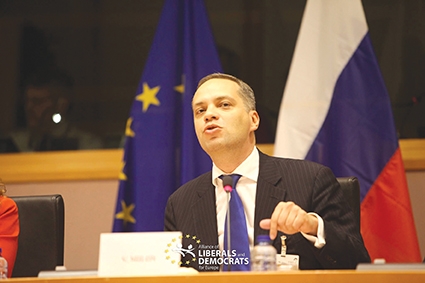Russian Opposition Leader Criticizes Kremlin’s Policy of Territorial Expansion
Roughly three weeks ago, the Russian opposition leader, Aleksey Navalny, released an investigative video into Prime Minister Medvedev’s alleged vast fortunes that the latter has allegedly amassed through (surprise!) corruption: palaces, yachts, vineyards, you name it. The eye-watering riches of Russia’s second most powerful man (officially, at least) irked the nation that has been struggling under massive economic recession and the burden of economic sanctions imposed by the West for three years and counting. “Don’t call him Dimon” has been watched more than 17 million times on Youtube, and after the Kremlin showed no signs of breaking silence over the matter anytime soon, thousands of protesters took to the streets. “Dimon must answer” was the main motto of nationwide protests that culminated in a record-breaking number of arrests never before seen in Putin’s leadership. Navalny himself was promptly dished out a 15 day sentence – a somewhat mild reaction by the Kremlin given the magnitude of the protests. What will be his and his supporters’ next step to make PM Medvedev answer? What can be achieved for the pro-Western, Anti-Putin Russian opposition? This was what Panorama Talk Show and GEORGIA TODAY discussed with Vladimir Milov, Russian opposition politician and the founder of the pro-western “Democratic Choice” party. He kicked off by stating that the figure of Medvedev might just be a symbol that the media wrapped their spin around, stressing instead that there was an unprecedented scale of general discontent in Russia, with people growing increasingly restless with a regime which “cuts people out of the country’s wealth”.
“This negativity has been brewing for some time now,” Milov told us. “Of course, people have been mentioning Medvedev a lot, but the main problem isn’t what he did. The main problem is absolutely no reaction from Russian authorities. They tried to ignore it, and this didn’t sit well with people. It’s a huge exposure of corruption at the very head of the government – and all we get is silence. This very silence, entwined with ignorance and unwillingness to stand accountable, is what drove people from their homes to the streets, rather than the figure of Medvedev himself, or any other official in the Kremlin”.
Any other official is a rather broad term - with Medvedev just a figurehead, what about his patron, the all-powerful, larger than life Tsar of all Russia? Surely Putin would be next in line if Medvedev ever had to answer to the nation? (Assuming, of course, that it won’t be Putin judging him). Mr. Milov dully confirmed our assumptions:
“Of course. Most of this is targeted at Putin and the reality he has brought about. Every child in Russia know who’s in charge of this corrupt system – that it stands on one man’s shoulders. And that man is Putin. So, absolutely, he’s next in line.”
Navalny will have to go head to head with Putin in the upcoming presidential campaign, in what promises to be troublesome, if interesting, times for Russia. However, with all the struggle for power in our big, angry neighbor, one question looms large for Georgians – Even if the protesters achieve the presently highly unlikely victory, if, say, Navalny becomes president, or, Milov himself does, what will Russia do with Abkhazia and South Ossetia? Will the new, democratic Russian government take recognition of their independence back?
Pro-Westerness seems to have really “defiled” our respondent’s mind, as he doesn’t hesitate to give back a reply that would shock most of Russia’s political elite. Namely, he says he never recognized Abkhazia and South Ossetia as anything but Georgian territories and called for the leaders of the breakaway regions to sit together with the Georgian government to discuss plans of reintegration.
But prominent as he might be, Milov is not yet Navalny. And it seems he has no desire to be. So, is Milov’s take on the subject shared by the leader of Russia’s opposition?
“You’ll have to ask him that specifically,” Milov says. But the dominant thinking among the Russian opposition is that we have enough legitimate land as it is- we are the biggest country in the world, after all! So, we’ve got to turn our attention inside and fix our own problems at home.
“Territorial expansion, and this is essentially what happened with Abkhazia and South Ossetia, is the wrong policy, we’re completely against it and I’m pretty sure that Aleksey Navalny somehow shares this view as well,” he concluded, leaving us somewhat puzzled and at the same time, hopeful.
Vazha Tavberidze












